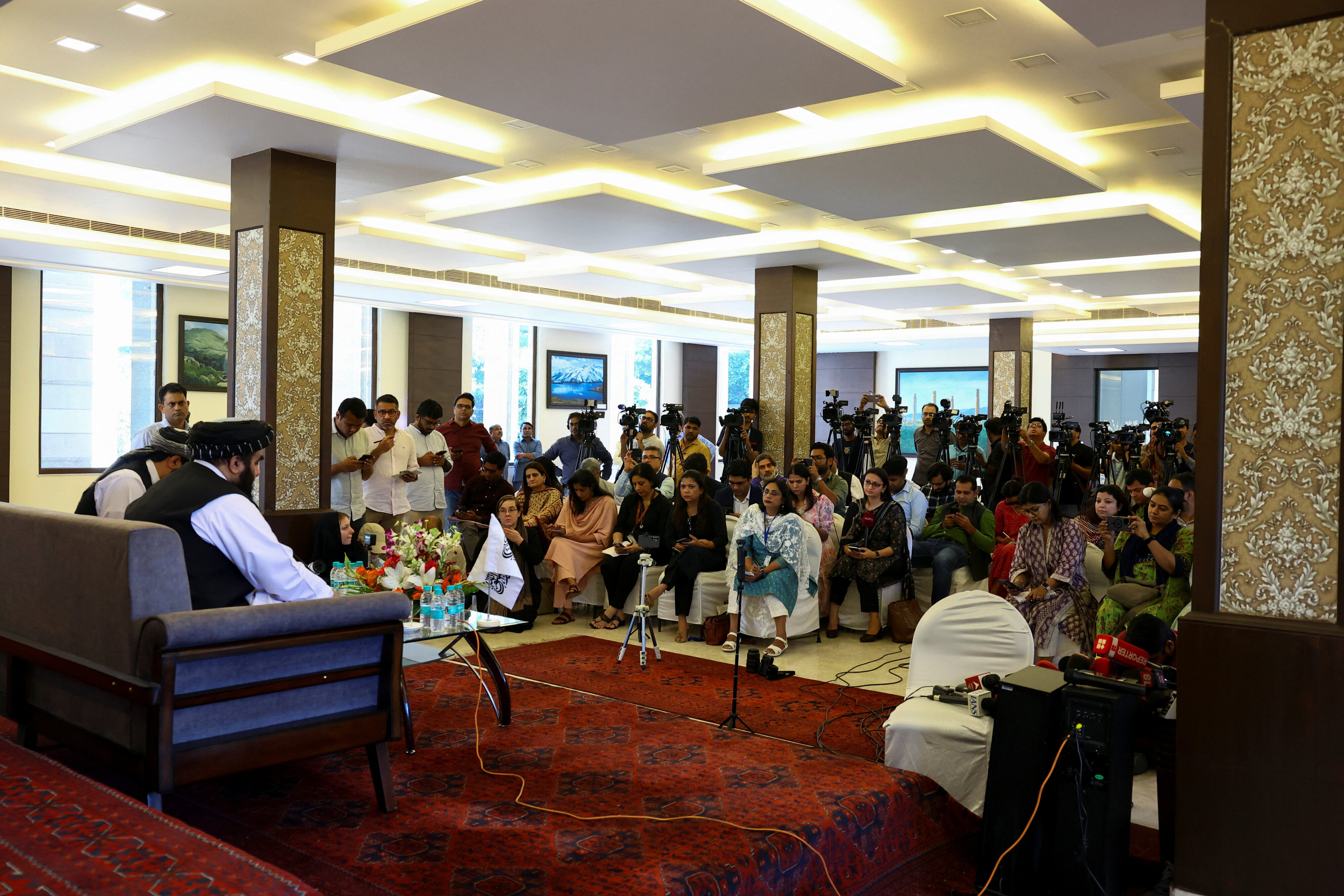A recent visit to India by the top diplomat of the Taliban government in Afghanistan meant to showcase a warming relationship between the two countries instead set off a storm of controversy when female journalists were excluded from a press conference at the Afghan Embassy in Delhi, exposing issues with misogyny deeply rooted in both countries.
Afghan Foreign Minister Amir Khan Muttaqi made a weeklong trip to India in early October — enabled by a temporary waiver of United Nations sanctions permitting him to travel — the first official trip to India by a senior Taliban leader since the group’s 2021 return to power in Afghanistan. It was meant to signal New Delhi’s tentative efforts at establishing ties with Kabul, without conferring formal diplomatic status, but the visit did not get the kind of coverage they might have hoped for.
Instead, the Afghan government’s attempts at gaining diplomatic legitimacy or engaging with regional powers were overshadowed on the fourth day of his visit, when the Afghan Embassy held a press conference — and invited only male reporters.
The backlash was immediate, and came from many quarters. The Press Club of India "strongly condemned” the move, while the Editors Guild of India lambasted it as "blatant gender discrimination on Indian soil."
Male journalists who had attended the press conference were criticized for not walking out in solidarity with their female colleagues. Rahul Gandhi, opposition leader in India’s Lok Sabha (lower house of Parliament), posted on the social media site X, "In our country, women have the right to equal participation in every space.”
As the criticism gathered steam, the administration of Prime Minister Narendra Modi — which critics say could have insisted on the presence of women journalists at an event on Indian soil — instead placed blame on the notoriously misogynistic Taliban. It claimed that the Indian government “had no involvement in the press interaction held yesterday by the Afghan FM [foreign minister]” at the embassy in Delhi. That response only deepened the criticism that the world’s largest democracy was apparently capitulating to the Taliban.
As the controversy grew and threatened to eclipse Muttaqi’s visit, the Afghan delegation was forced to make amends. A second “inclusive” press conference was called two days later, on Oct. 12. In a dramatic show of force, Indian women journalists occupied the front-row seats, with photographers capturing Muttaqi face-to-face with a rare adversary: female reporters.
Afghanistan remains the only country in the world where girls and women are banned from pursuing education beyond the primary level. Taliban authorities also enforce strict rules governing women’s lives — dictating their dress, restricting their movement, and requiring them to be accompanied by a male guardian when traveling. Muttaqi’s second press conference in India, after initially banning women reporters, became all about his government’s gender discriminating policies.
Muttaqi insisted that women journalists had been left out of the first press conference due to a “technical issue,” without elaborating. He added that in Afghanistan nearly 2.8 million women and girls are going to school and that, “there are certain limitations in specific parts, but that does not mean that we oppose education.”
It was a sight to behold — Muttaqi spouting a string of falsehoods while fielding questions from Indian women reporters in saris and traditional South Asian salwar-kurtas, and without their heads covered. Although Muttaqi stuck to his rhetoric, watching him respond to pointed questions from women about gender struck some as surreal. It was also gratifying for many of India’s female journalists, who often face hostility from their own government and deal with relentless online abuse, trolling, threats of sexual violence, and harassment when working in the field. What’s more, despite a large percentage of women in India’s press corps, they remain underrepresented in senior newsroom leadership positions.
"Few expected [Indian Prime Minister Narendra Modi] to stand up to a foreign delegation on press issues when there’s been little accountability at home."
The initial press conference had been unusual, and disturbing, for how easy it had seemed for the Taliban to bar women journalists on Indian soil. Also unusual was the response: a rare showing of media solidarity in a country where news organizations are deeply divided along political and ideological lines.
But the victory felt short-lived.
By the following Monday, the sinking feeling I often carry with me as a female member of India’s press corps was back — the anger over the ever-present hypocrisy renewed. The only difference between the Taliban and the Modi administration, I thought — both of which subjugate women to different degrees — is that the Taliban takes a principled stand when it comes to misogyny, wearing it like armor and enforcing it through official decrees. The misogyny of the Modi administration, in contrast, is draped around it like a silk sari, more subtle but equally impactful — embedded in the culture and tradition.
Despite the Modi government’s claim to the contrary, it stretches credulity to think the Taliban was allowed to bar female journalists from the first press conference without the tacit support of the Indian government, which seemingly acquiesced to the bizarre demand only to please the Taliban.
Modi’s administration has shown no love for the press — male or female. He is the first leader to occupy the prime minister’s office without ever holding a press conference with open availability (that is, without preselected questions), during his 12 years in power.
Few expected him to stand up to a foreign delegation on press issues when there’s been little accountability at home, where journalists are murdered and women are gang-raped. None of these serious issues have managed to build solidarity amongst India’s fractured, partisan media. Standing up to the Taliban in New Delhi takes less courage than the nation’s media uniting — men and women, conservative and liberal outlets — to demand the same type of accountability from our own government.



